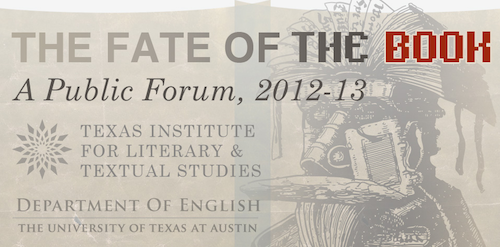
(Image credit: TILTS)
The Texas Institute for Literary and Textual Studies (TILTS) kicks off the 2012-2013 season tomorrow night with a lecture by Nicholson Baker, to be held in Blanton Auditorium at 5:30 PM. It’s open to the public, and all within the Austin area are encouraged to attend. TILTS is an initiative supported by the Office of the President, the Vice-Provost, the College of Liberal Arts, and the Department of English of The University of Texas at Austin. Each year the symposium brings a group of scholars to campus with the goal of enriching intellectual life in the community, and I can’t say how much I appreciate the program and the extent to which I think it’s an absolute success. Each year the symposium takes on a different theme (“The Digital Human[ities]”, 2010-2011; “Poets & Scholars”, 2011-2012), and this academic year we’ll be hearing about “The Fate of the Book”. Auspiciously titled, no doubt, but certainly relevant. And though advance copy of Nicholson Baker’s speech isn’t circulating (surely this is as important as major politicians’ speeches?), my familiarity with his books suggests that he’s going to be rather optimistic about the fate of print.

(Image credit: Reuters)
I don’t think we could be hearing about “The Fate of the Book” at a better time. Yesterday we woke up to news that there’d been a significant riot at a Foxconn Technology production facility in Taiyuan, China. This plant makes products for Apple, Dell, and Microsoft, and many sources are reporting that the new iPhone 5 has been coming out of the Taiyuan plant. While reports of worker strife in China are always spurious, we do know that at least 5,000 police offers were called in to quell the uprising. It must have been significant. So, I ask, if books are being made obsolete by various tablets and mobile computing technologies, is our convenience worth the price of exploiting poor workers in places like China and Brazil? Read enough books and you’re sure to answer that question in the negative.
On a less urgent and more domestic note, it’s striking how many arguments in the ongoing election cycle are blatantly dependent upon voters’ illiteracy. It’s shocking, really. Assuming that readers of this blog vote for both sides of the spectrum (I know, I know…most of us probably vote left, but pretending for a sec that we live in a vibrant democracy) I’ll quickly give a benign example. Two days ago, at a fundraiser for Todd Akin, Newt Gingrich proclaimed that “My expectation would be that in the crunch, in October, governor Romney is going to be for the entire ticket, and he’s going to be for Todd Akin.” While this does sound like Gingrich’s typical line of argument, he’s telegraphing Republican hopes that Missouri voters will have completely forgotten about Akin’s odd perspectives by Election Day. Democracy’s contingent upon a critical citizenry, and I’d hate to think that Missouri voters could forget about Akin’s remarks in such a short span of time. I happen to think that reading books impedes such apathy and is fundamentally important to the future of a democratic society. It’s clear that digital literacies will be necessary for corporate success in the twenty-first century, but I’ve yet to see any evidence that they will enhance democracy in the same way that traditional literacy did throughout the eighteenth and nineteenth centuries.

(Image credit: easyvectors.com)
Digital literacies are important for any number of reasons, and it’s an honor that we have the opportunity to teach them in the twenty-first century. These days, anyone with a decent bachelor’s degree should be able to figure out how to use seemingly odd new computing programs, especially if they had no knowledge of how those programs worked previously. That’s the mark of digital literacy, by my measure. But it strikes me as unfair to assume that a digital system could somehow replace books. For one thing, technology remains very expensive. Lower-income homes simply cannot afford Apple products (even if the company does own an aluminum mine, which I’m starting to suspect they do), and I bet that a majority of humans will continue to read books long into the future, so long as they have access to basic education. Aside from economic constraints, most graduate students I know seek out physical books when they wish to do a few days’ worth of serious reading. Half of my own students choose to read physical versions of our text, even though everything is available digitally. In fact, when I’m in the airport, most of the people I see reading digital books are of my parents’ generation.
So, in short, I do feel optimistic about the future of books. It’ll be fun to hear what others have to say throughout the course of this year’s TILTS symposium. If nothing else, I can’t imagine that humans would ever stop telling ourselves stories – that would certainly represent a certain death.



Recent comments
2 years 29 weeks ago
2 years 44 weeks ago
2 years 44 weeks ago
2 years 50 weeks ago
3 years 4 weeks ago
3 years 4 weeks ago
3 years 4 weeks ago
3 years 6 weeks ago
3 years 6 weeks ago
3 years 6 weeks ago